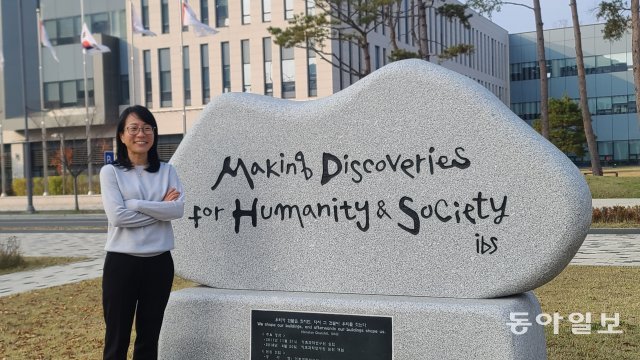Morning star, morning star, evening star, dog food …. This celestial body, called by many names, is not actually a “star”. It is “Venus” that shines bright just before sunrise or just after sunset.
Recently, a research organization for Venus led by a planetary scientist in her thirties was recently formed at the Institute for Basic Science (IBS). It is the “Planetary Atmosphere Group” of the “Climate and Earth Sciences Research Center”, launched in June this year as IBS’s first earth science research center. It is the first time that the Goldstar research organization has been founded in a government-funded research institute in Korea.
In order to nurture future generations of research leaders, IBS selects a CI (Chief Investigator) who is equivalent to the head of the research team each year and gives them the “full power” to set their research topic and organize their research. organization. After completing his bachelor’s and master’s degree in atmospheric science from Yonsei University, he went to the Max Planck Institute for Solar System in Germany and earned his doctorate from Brunswick Technical University, assuming responsibility for the IBS Planetary Atmosphere Group to find the future of Earth on Venus. I met him at the Daejeon IBS headquarters on the 1st.
“Why is Venus these days, when it’s noisy to go to the moon and Mars?
“Venus is nicknamed the ‘Evil Twin’. Venus is similar in size and volume to the Earth, but has a completely different climate. It suffers from atmospheric pressure more than 90 times that of the Earth, clouds of sulfuric acid and a high temperature of 460 degrees or more. Venus, which in the past may have had oceans, is now an “extreme hell” due to the greenhouse effect. If we can understand why the two planets are different, we can prepare for the future of our planet ”.
“I hear the saying ‘the revival of the study of Venus has come’.
“In the 1980s, the Soviet Venera probe landed on Venus and found that the surface of Venus was dry, effectively blocking the exploration of Venus. But last year, ESA announced plans to send NASA’s “Envision” and “Da Vinci +” and “Veritas” probes to Venus, respectively. Russia also presented the “Venara-D plan” to succeed the Venera program, which ended in 1984, and India is preparing to launch the Venara probe called Shukrayan-1. This is because a new aspect of Venus has recently been discovered ”.
ESA’s Envision plans to study the surface, underground and atmosphere of Venus. NASA’s “Da Vinci +” will study the formation and evolution of planets through Venus’s atmosphere and examine whether there were oceans in the past. ‘Veritas’ intends to explore the geological history of Venus, including rock formations.
– A new aspect of Venus.
“The first copy of the first European Mars probe ‘Mars Express’ (2003) was used for the exploration of Venus by ESA’s Venus Express’ Venus probe, active from 2005 to 2014. The probe’s activity reveals that Venus is currently volcanic “.
―The current trend in research on Venus.
“Unidentified absorbers have been observed in the upper clouds of Venus. The dark area in the Venus observation image is the area where the unidentified absorber absorbs a lot of ultraviolet light. Venus’s atmosphere will inevitably change if the amount of UV absorption changes, indicating the possibility of climate change on Venus as well. Research is underway to reveal the identity of this unidentified absorber. ”
– How do you observe Venus?
“The Venus probe ‘Akatsuki’ (meaning morning star) launched by JAXA in 2010 is providing the world with observational images of Venus. Japan was the fourth country to successfully enter orbit around Venus, after the Soviet Union, the United States and Europe. Since we don’t know when Akatsuki’s life will end, we need Plan B for Venus observations. “
“You studied Venus at ESA and JAXA, so why did you come to Korea?
“The person who proposed the Venus Express project to ESA was my boss when I was attending a German research institute. I accepted the challenge when I saw that IBS in Korea had published a notice granting researchers full autonomy. We will collaborate with national startups to launch a microsatellite (CubeSat) and observe Venus ”.
 Zoom inIBS Planetary Atmospheric Group CI, Lee Yeon-joo, standing in front of the monument at the Daejeon IBS headquarters. Daejeon = Correspondent Kim Seon-mi [email protected]
Zoom inIBS Planetary Atmospheric Group CI, Lee Yeon-joo, standing in front of the monument at the Daejeon IBS headquarters. Daejeon = Correspondent Kim Seon-mi [email protected]―The future you dream of through research on Venus.
“When I look at the observation images of Venus every day, I think we are lucky to live on a beautiful planet called Earth, to bond and love each other. If you hadn’t known Venus, you wouldn’t have realized how blessed the Earth is. If there is extreme warming on Earth, there is no way it can’t be like Venus is right now. I also dream that Korea will be able to create research materials for Venus so that it can be jointly researched with the international community for the future of the earth. ”
Correspondent Seon-mi Kim [email protected]
![‘Extreme Hell’ Venus … If you know Venus, you can see the future of the Earth[더 퓨처스] ‘Extreme Hell’ Venus … If you know Venus, you can see the future of the Earth[더 퓨처스]](https://dimg.donga.com/a/600/0/90/5/wps/NEWS/IMAGE/2022/11/06/116337806.1.jpg)


